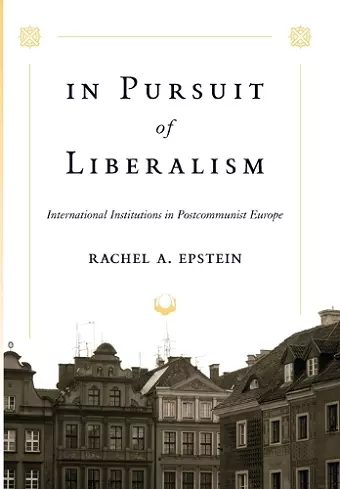In Pursuit of Liberalism
International Institutions in Postcommunist Europe
Format:Hardback
Publisher:Johns Hopkins University Press
Published:7th Oct '08
Currently unavailable, and unfortunately no date known when it will be back

Epstein's study of the international influences on postcommunist change spans the divide between political economy and security studies. It will be of great interest to students of both fields. -- Jeffrey Kopstein, University of Toronto The transformation of Europe since the end of the Cold War often obscures the precise role played by international institutions and domestic context. By focusing on Poland, Hungary, Romania, and Ukraine, Epstein succeeds in providing a valuable theoretical and empirical contribution to the comparative and international political literature. This is a book that must be read by all students of comparative and international political economy. -- James A. Caporaso, University of Washington Rachel Epstein's book offers a very important and persuasive corrective to the claim that IO leverage over postcommunist reformers best explains reform outcomes. Epstein argues that IOs can only have profound influence when a series of three factors--uncertainty, status, and credibility--result in the right kind of social environment. The central argument is clear, well-supported, and important. -- Wade Jacoby, Brigham Young University
Offering new data on and fresh interpretations of reforming central bank policies, privatizing banks with foreign capital, democratizing civil-military relations, and denationalizing defense policy, In Pursuit of Liberalism extends well beyond the scope of previous book-length studies.Though the fall of the Soviet Union opened the way for states in central and eastern Europe to join the world of market-oriented Western democracies, the expected transitions have not been as easy, common, or smooth as sometimes perceived. Rachel A. Epstein investigates how liberal ideas and practices are embedded in transitioning societies and finds that success or failure depends largely on creating a social context in which incentives held out by international institutions are viewed as symbols of an emerging Western identity in the affected country. Epstein first explains how a liberal worldview and institutions like the European Union, World Bank, the International Monetary Fund, and the North Atlantic Treaty Organization go hand-in-hand and why Western nations assume that a broad and incremental program of incentives to join will encourage formerly authoritarian states to reform their political and economic systems. Using Hungary, Poland, Romania, and the Ukraine as case studies, she demonstrates the limits of conditionality in the face of national social perceptions and elucidates the three key points around which a consensus within the state must emerge before international institutions can expect liberalization: domestic officials must be uncertain about how changing policies will affect their interests; the status of international and domestic institutions must not be in jeopardy; and the proposed polices must seem credible. In making her case, Epstein cleverly bridges the gap between the rationalist and constructivist schools of thought. Offering new data on and fresh interpretations of reforming central bank policies, privatizing banks with foreign capital, democratizing civil-military relations, and denationalizing defense policy, In Pursuit of Liberalism extends well beyond the scope of previous book-length studies.
Rachel A. Epstein makes a fine contribution to a small but growing body of literature that tries to explain why some postsocialist countries were so quickly able to embrace modern western institutions and reintegrate with Europe. -- Peter Rutland Slavic Review 2010
ISBN: 9780801889776
Dimensions: 229mm x 152mm x 24mm
Weight: 544g
288 pages